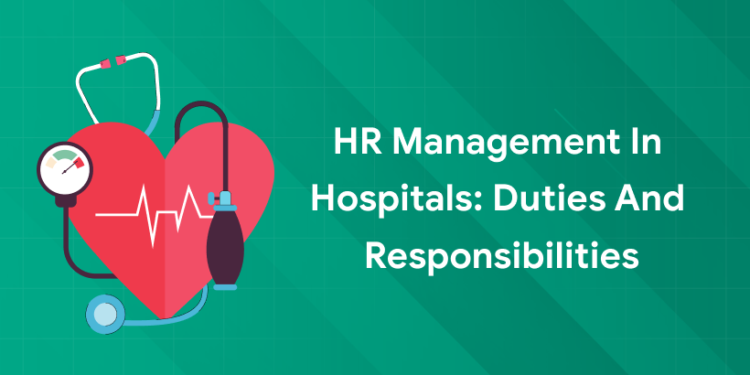Table of Contents
Key Takeaways:
- Hospital HR management is essential for maintaining a skilled, motivated healthcare workforce.
- Recruitment, training, performance management, and compliance are core HR responsibilities.
- Addressing burnout and turnover requires proactive engagement and wellness initiatives.
- Leveraging technology enhances HR operations and decision-making.
- Compliance with healthcare regulations protects hospitals legally and ethically.
Introduction
Imagine walking into a hospital where every staff member, from doctors to janitors, seamlessly coordinates to provide the best healthcare experience. Behind this smooth operation lies the often-overlooked force of Human Resource Management (HRM). Hospital HR management is not just about hiring staff—it’s about nurturing a compassionate workforce dedicated to saving lives and maintaining hospital excellence.
In today’s fast-paced healthcare environment, the role of HR in hospitals has expanded far beyond recruitment. It’s about strategic workforce planning, compliance, staff engagement, and ensuring well-being. This blog unpacks the vital duties and responsibilities of hospital HR management, revealing how it shapes patient care and institutional success.
What is HR Management in Hospitals? An Explicit Definition
1: What is the primary role of a hospital administrator?
HR Management in hospitals involves the recruitment, development, and welfare of healthcare professionals to ensure efficient hospital operations and quality patient care. It encompasses managing staffing needs, employee relations, compliance with healthcare laws, and fostering a positive workplace culture.
Why is HR Management Crucial in Hospitals?
Because hospitals operate 24/7 and deal with critical life situations, HR management must ensure the right talent is available, trained, and motivated. The quality of healthcare depends heavily on having a competent and supported workforce.
Hospital Administration Course with Assured Career Growth
Hospital Administration Course by Entri App: Master essential healthcare management skills, gain certification, and secure top roles in leading hospitals
Join Now!Core Duties and Responsibilities of Hospital HR Management
-
Workforce Planning and Recruitment
What are the HR duties in staffing hospitals? HR departments identify required roles, from doctors and nurses to technicians and administrative staff. They conduct recruiting drives, manage candidate pipelines, and ensure hiring complies with healthcare regulations.
The stakes are high as hospitals face workforce shortages worldwide; strategic hiring ensures the hospital meets patient needs without compromising care quality.
Recruitment activities include creating detailed job descriptions, advertising vacancies on platforms relevant to healthcare careers, screening candidates for specialized healthcare credentials and soft skills vital in patient care environments. Collaboration with department heads helps HR forecast future staffing requirements aligned with hospital growth and seasonal demand fluctuations.
-
Employee Orientation and Training
How does HR support new hires? New employees undergo comprehensive orientation introducing hospital policies, ethical standards, and workplace culture. Ongoing training ensures staff stay up-to-date with medical advancements and compliance requirements.
Training programs also tackle critical areas like patient safety and emergency preparedness, essential for hospital readiness.
Effective orientation involves welcoming sessions, introduction to hospital technology systems, compliance briefings (HIPAA, patient confidentiality), and partnership with mentors. Continuous learning is fostered through workshops, webinars, and certifications on areas such as infection control, medical coding, and communication skills vital in sensitive healthcare contexts.
-
Performance Management
How is staff performance managed in hospitals? HR monitors employee evaluations, facilitates feedback, and implements corrective actions if required. Performance appraisals help identify training needs and career development opportunities.
Conflict resolution and disciplinary procedures maintain workplace harmony, which is crucial in high-stress environments like hospitals.
Hospitals commonly use a structured appraisal cycle including self-assessments, peer reviews, and supervisor evaluations. Goals are aligned with hospital standards on patient care, punctuality, teamwork, and adherence to protocols. HR also mediates serious performance issues through counseling or formal disciplinary action.
-
Compensation and Benefits Administration
What role does HR play in employee compensation? Hospital HR oversees payroll, administers benefits such as health insurance and retirement plans, and ensures statutory compliance (e.g., Provident Fund, ESIC). Competitive compensation packages help retain skilled professionals in a sector known for high burnout rates.
Regular pay surveys help hospitals remain attractive employers in a competitive market.
| Component | Purpose | Example in Hospitals |
|---|---|---|
| Salary Management | Timely, accurate payment of wages | Monthly payroll processing for clinical & admin |
| Benefits Administration | Manage health insurance, gratuity, retirement plans | Group health insurance, PF contributions |
| Statutory Compliance | Ensure legal adherence to labor laws | ESIC registration, adherence to minimum wage laws |
| Pay Structure Review | Adjust wages competitively based on market data | Annual salary benchmarking |
-
Employee Engagement and Retention
How does HR keep hospital staff motivated? HR implements programs to reduce turnover, such as wellness initiatives, flexible scheduling, and recognition awards. An engaged workforce translates directly into better patient outcomes and lower absenteeism.
Retention strategies include mental health support programs, peer recognition systems, and career pathing. Flexible shift planning accommodates personal lives, critical to job satisfaction in healthcare jobs with unconventional hours. Employee feedback surveys and exit interviews help continually refine HR policies.
-
Compliance with Healthcare Regulations
What legal responsibilities does hospital HR uphold? Hospitals must comply with labor laws, workplace safety standards, and healthcare regulations. HR ensures policies are up-to-date with legal requirements and educates staff on ethical practices and patient confidentiality.
Compliance with standards such as NABH accreditation, OSHA safety protocols, and privacy laws like HIPAA is monitored. HR conducts audits, refresher training, and enforces disciplinary actions for violations to maintain trust and legal safety.
-
HR Information Systems (HRIS) and Data Analytics
How does technology enhance hospital HR management? Modern hospitals use HRIS to streamline recruitment, payroll, attendance, and performance tracking. Data analytics provides insights for workforce optimization, identifying trends like absenteeism or skill gaps.
HRIS platforms enable centralized employee databases, automated leave management, and real-time reporting. Analytics inform strategic decisions such as hiring needs, training effectiveness, and employee satisfaction metrics, ultimately leading to cost and time efficiencies.
Also read: Responsibilities of Hospital Administrators
Challenges Faced by HR in Hospitals
- Staff shortages and high turnover due to a stressful work environment.
- Burnout and mental health challenges are prevalent among healthcare workers.
- Navigating complex and evolving healthcare labor laws and regulations.
- Balancing hospital policies with union and employee demands.
Best Practices for Effective HR Management in Hospitals
- Provide flexible work hours and competitive compensation packages to attract and keep staff.
- Encourage continuous professional development and offer certifications.
- Utilize technology like HRIS for efficient process management.
- Foster a culture of communication and transparency to boost morale.
- Implement wellness and support programs focused on mental health and stress reduction.
Hospital Administration Course with Assured Career Growth
Hospital Administration Course by Entri App: Master essential healthcare management skills, gain certification, and secure top roles in leading hospitals
Join Now!Entri’s Hospital Administration Course
Aspiring to excel in hospital HR management? Entri offers a comprehensive Hospital Administration Course in Kerala designed to equip you with the skills needed to thrive in healthcare administration roles. This course features expert-led modules on HR management, healthcare laws, and operational management.
With placement assistance, personalized mentoring, and practical insights, Entri’s course is your gateway to a rewarding career in hospital administration. Explore the course details and enroll today to contribute meaningfully to healthcare excellence.
Conclusion
Effective HR management in hospitals is the backbone of quality healthcare delivery. By bringing together the right people, fostering their development, and ensuring a supportive and compliant work environment, hospital HR professionals play a pivotal role in patient outcomes and institutional success.
In a sector where every second counts and every decision impacts lives, empowered and well-managed staff make all the difference. Whether you’re an HR professional, hospital administrator, or aspiring healthcare manager, understanding these duties and embracing best practices is key to navigating the complex, rewarding world of hospital HR management.
Hospital Administration Course with Assured Career Growth
Hospital Administration Course by Entri App: Master essential healthcare management skills, gain certification, and secure top roles in leading hospitals
Join Now!Frequently Asked Questions
What is the key role of HR in hospitals?
HR is responsible for recruiting, training, managing, and supporting hospital staff to ensure quality healthcare delivery.
How does HR contribute to patient safety?
By training staff on protocols and maintaining staffing levels to avoid fatigue-related errors, HR indirectly improves patient safety.
What makes hospital HR different from other industries?
The critical nature of healthcare, combined with regulatory complexities and 24/7 service requirements, makes hospital HR uniquely challenging.
How can hospitals reduce staff turnover?
Competitive pay, career development opportunities, work-life balance, and staff recognition are effective retention strategies.
What technologies support hospital HR functions?
HR Information Systems (HRIS), payroll software, e-learning platforms, and data analytics tools are commonly used.















